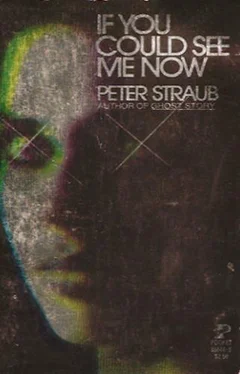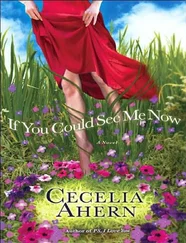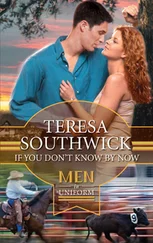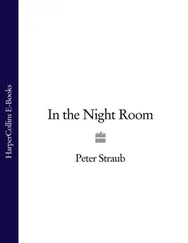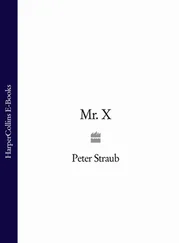“What color was it?”
“It was all dust. I couldn’t see.”
“You know, Mrs. Sunderson,” I said, putting it very slowly so she would not miss a word, “if it was your son or any of his friends that came in here that night and turned on the gas, they were attempting murder. The law takes a hard line on that sort of thing.”
Furious, baffled, she turned around. “My boy’s no sneak!”
“Is that what you’d call it?”
She whirled around again and began to dust the dishes so vigorously that they rattled. After a moment she permitted herself to speak, though not to face me. “People say something else happened. They say Galen Hovre is going to get him soon. They say he sits down there in his office knowing a lot more than he tells.” Then another wall-eyed peek at me. “And they say Paul Kant is starving himself in his mother’s house. So if it happens again people will know he was inside and didn’t do it.”
“What a field day they’re having,” I said. “What fun they’re all having. I envy them.”
She shook her head maddeningly, and I would gladly have gone on in that vein, but the telephone rang. She glanced at it and then at me, telling me she would not answer it.
I put the sheet of paper down on the table and picked up the receiver. “Hello.” Silence, breathing, the smells of onions and beer. I do not know if these were truly the odors of my caller, or if they were only those I expected from someone who made anonymous telephone calls. Tuta Sunderson pounced on the sheet of paper.
“You miserable boor,” I said into the mouthpiece. “You have pigshit where you should have an imagination.”
My caller hung up; I laughed at that and at the expression on Tuta Sunderson’s face. She put down the misspelled note. She was shocked. I laughed again, tasting something black and sour at the back of my throat.
When I heard the porch door slam I waited until I saw her toiling up the road, the lumpy cardigan over one arm and the handbag jigging on its strap. After a long while she moved out of the frame of vision the window gave me, struggling in the sunlight like a white beetle. I put down my pencil and closed the journal. Standing on the cool porch, I looked up toward the woods — all was still, as if life stopped when the sun was so high. Sound told me that it did not: out of sight down the road, Duane’s tractor put-putted from the far field, birds said things to one another. I went down the rutted drive, crossed the road, and jumped the ditch,
On the other side of the creek, I could hear crickets and grasshoppers, and small things whirring in the grass. I went up the bifurcated hill; crows took off from the alfalfa, screeching, their bodies like flak, like ashes in the air. Sweat dripped into my eyebrows, and I felt my shirt clammily adhering to my sides. I thumped down into the dip and then began to rise again, walking toward the trees.
This was where she had twice led me. Birds twittered, darting through branches far above. Light came down in that streaming way it does only in forests and cathedrals. I watched a gray squirrel race out onto a slender branch, bend it under his w, and then transfer to a lower, stouter branch like a man stepping out of an elevator. When the ground began to alter, so did the trees; I walked on spongy gray mulch between oaks and elms; I skirted pines and conifers and felt thin brown needles skid underfoot. As when I lay on the polished floor, I waded through high leafy beds of ferns. Berries crushed against my trousers. A lightning-blasted old ruin of an oak lay splintered and jagged in my path, and I jumped on top of it, feeling the softness of rotting wood. Filaments of green snagged and caught in the eyelets of my boots.
Going as I had gone in vision that night, I passed the thick unmoving trees until I saw where they seemed to gather like a crowd at an accident: I slid through a gap, and was in the clearing. The sunlight, after the filter of the network of the leaves, seemed violently yellow and intense, lionlike, full of inhuman energy. Tall grass tipped under its own w. Insect noises hovered in vibrato over the clearing. A chirring unmoving noise.
At the center, in the charred place, the ashes showed a still red core, like the ashes in Rinn’s old woodstove. It had Alison’s warmth. Galen Hovre was wrong about Duane and my cousin. Or Duane, all those years ago, had lied.
Oddly, perhaps predictably, when I had dreamed about walking up into the woods the journey had a direct, palpable actuality, and when I actually went up there it felt like dreaming. I thought, almost fearing it, that I would sense some deeper closeness to Alison Greening if I approached the clearing where I had met her dreadful apparition in my vision; that space was hers, and I thought of it as the source of the chill which penetrated the old farmhouse. If there is another world, a world of Spirit, who is to say that its touch may not shake us to our boots, that its heat may not come to us as the cold of quarry water? But discounting that nightmare vision of Alison as a creature stitched together from leaves and bark, indirection brought me closer to her, evoked her more satisfactorily, than a crude search through the woods and clearing. I had begun a memoir, a task she had motivated (I could remember her telling me, one high summer day when we climbed the hill behind the valley and, carrying shovels, searched for Indian mounds, that she was going to be a painter, and I a writer), and it seemed to cement us even further, since — at the most obvious level — it meant that I thought about her even more than I might otherwise. She was the groundbass of what I wrote. It was as though I were reeling her in, sentence by sentence. And then, one morning after suffering through a breakfast presided over by a Tuta Sunderson who had accepted seven one-dollar bills from me and then wordlessly handed back two as if they represented an immoral suggestion, I had driven the Nash loaner over the Mississippi bridge on Highway 35 — a wonderful American sight, those islands showing their wooded backs like green water buffaloes in the brown river — to Winona, Minnesota, looking for the, records necessary to the Alison-environment. If I’d had to, I would have gone all the way to Minneapolis, Albums on the Pacific label from the ‘fifties are rare items. An initial glance through the racks in a Winona record store unearthed none, but then I saw the sign saying Second Hand Department Downstairs, and went down to flip through, in a basement illuminated by a single bulb, crate after crate of albums with worn sleeves and crumbled spines. Surrounded by cast-off Perry Comos and Roy Acuffs and Roger Williamses, two records shone like gold, and I grunted with such loud approval that the owner appeared at the top of the stairs to ask if I were all right. One was an old Dave Brubeck record I remembered Alison telling me she had loved (Jazz at Oberlin) and the other — -well, the other was a true find. It was the Gerry Mulligan quartet album on Pacific which Alison had urged me to buy, the one with a cover painting by Keith Finch. Finding that record was like finding a message from her scrawled on a page of my manuscript. It was the record, above all others, which evoked her, the one she had most cherished. The owner of the record store charged me five dollars for the two records, but I would have paid twenty times that. As much as my writing, they brought Alison nearer.
“What is that stuff you play all the time?” asked the Tin Woodsman. She was standing on the porch on Saturday night, peering in through the screen door. “Is that jazz?” I put my pencil into my manuscript and closed it. I was sitting on the old couch downstairs, and the kerosene lamps shed a muted orange glow which softened her features, blurred already by the mesh of the screen. She wore a denim shirt and trousers, and looked more feminine, in that soft light, than I had ever seen her. “Look,” she said, “it’s okay. I mean, Dad’s in Arden for some kind of meeting. Red Sunderson called him just before dinner. All the men are talking about something. They’ll probably be at it for hours. I heard you playing that record the other day. Is that this kind of music you like? Can I come in?”
Читать дальше
